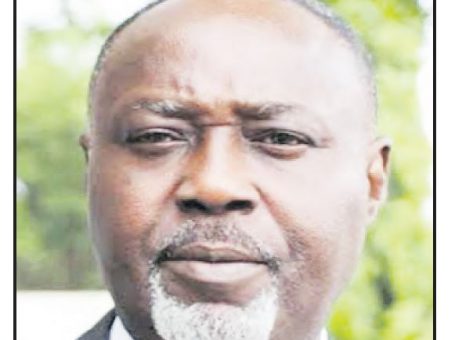Chief George Moghalu is the pioneer National Auditor of the ruling All Progressives Congress (APC). In this interview with JIDE ORINTUNSIN, he speaks on the current challenges facing the nation, the prospects of the APC taking over the Southeast region and the agitation for a single six-year tenure for presidents and governors.
It has been almost nine months since you left NIWA. How has life been out of the office?
I would have been surprised if that question didn’t come. I am running a law degree programme with Nile University and a PhD programme at the University of Abuja.
How would you describe life outside active politics?
It has been interesting. People must accept the fact that whatever has a beginning has an end. When you are given an appointment, it comes with an exit date when you are expected to leave the stage. If your appointment is renewed, by the appointing authority, count yourself lucky. So, nothing surprising and unexpected happened. Whether I did well or not at NIWA is left for posterity to judge and for the people I served to assess me properly.
I have always replied to those asking me about my experience at NIWA by saying that it was interesting. I went there with a determination to change the narrative and, to the best of my knowledge, I succeeded. But it is only those that I served and other stakeholders that can properly assess my performance.
What are you missing leaving politics for the classroom?
I have not left politics because it is part of my life. What I have done was manage my time to accommodate my studies and at the same time still be involved in politics. Yes, I have to admit that I may not have been as visible as I used to be because I am not holding any appointive or elective position.
There are speculations that you have left the APC for the LP. How true is this?
You must understand that at my level in politics in this country, I have never jumped from one party to another. The social media report of my joining the LP generated so much concern that people across the globe called to confirm the authenticity of that report. My answer has been that I am still a member of the APC. If I am going to leave the party, there is a process, especially for somebody at my level; I must resign my membership of the APC; not by proxy, but by formally writing to notify my ward about my intention to leave. I may not give any reason because it is my fundamental right to leave when I feel like doing so. And, if I decide to join another political party after due consultations, I will announce where I am going. I may even choose not to join any political party. I can be an independent player and even though there is no independent candidacy; I can be an independent influencer or driver of the process. That does not make me a non-political actor. It is not only until you belong to a political party that you are a politician. And let me repeat, if I decide to leave the APC, I will announce it publicly.
What is your APC membership status and relationship with the party leaders?
I am a full-fledged member of the APC. I am a card-carrying member of the party. I have personal relationships across the board that I have built over the years. Nobody, not even my enemy, can dispute that I have always been a key player in APC right from the formation. I didn’t join the APC; I was among those who sat down, drafted the constitution, had meetings, gave it a name, and registered it. I was the coordinating secretary of the group that gave birth to the APC. So, I am not an unknown quantity in the party; even my enemy will acknowledge that. My status in the APC is not in contention. It is not an issue for discussion or debate because my status is clear. Don’t forget that I was the pioneer National Auditor. I was re-elected for a second term. That was when former President Muhammadu Buhari appointed me the MD of NIWA. And that was the first time I left the APC national secretariat. And I have consistently been in party administration from 1999 till date.
Do you have plans to contest the Anambra governorship election next year?
If it pleases God that I will run for the election next year, I will make it public at the right time. For now, I am still consulting. As for the political platform, consultation is still on.
How do you rate other APC members aspiring for the position?
I have never claimed to be God. And I have always said that power belongs to God and He gives it to who He pleases and at His own time. I cannot stop anybody’s ambition. The political party is like a church, it has no gateman. One can be Pentecostal on Monday, decide to be Catholic on Tuesday, and a Muslim the next day. People can be driven by their ambition but the choice of who leads is a consequence of God’s design and manifestation through the people, who the power belongs to.
Don’t you see Governor Soludo as a big threat to your governorship ambition?
The truth is he cannot give what he does not have. He will do his best. He desires to win, but whether I am convinced he will win the second term or not will be a discussion for another day. You also asked if there is a formidable opposition that can unseat him and my answer is simple, there are quite a lot.
Many people are already showing interest in the seat. But, there is still time, at least over one year for the incumbent to prove some people wrong. Within that period, the other opposition parties have opportunities to present a strong candidate for the Anambra people to choose as an alternative. As I said, I am consulting across party lines because winning the governorship in Anambra is not a party affair. According to the statistics, those who are members of political parties are less than 30 per cent of the total registered voters. What happens to the other 70 per cent? You must get them to support you to make the needed impact in the election. It is not about the ticket of one party or another that will decide the election.
What are the factors that will encourage you to contest?
One of them is the acceptability of my aspiration and the platform by the Anambra people because the two go together. People will ask who the person is, what he is bringing to the table and on which platform he is running. These are the critical questions that must be asked. It is during the consultation that we will be able to find the answers.
Do you have any fears regarding the election?
I don’t have any iota of fear; not even one. There is no reason to entertain any fear over my aspiration. Not even the threat from the ruling APGA will rattle me. When the chips are down and we put the cards on the table, we will start asking some critical questions like to what extent has the incumbent delivered on the mandate given to him? Do we have prospects for improvements? Putting sentiment aside, is it where we should be? And where do we want to be in the next five years? These are issues that will be brought into public discussion.
One mistake many people make, especially we politicians, is to assume that the electorate is foolish. This time around, people are becoming more aware and are beginning to ask pertinent questions like Who are you? Where are you coming from? What have you done in the past and can you be trusted? Are you a promise keeper? What did you do in your previous engagements or assignments? And to what extent can you be accessed?
What is your assessment of Governor Soludo’s tenure so far?
There is a lot he ought to have done. There are other things that I would have done differently if I had the opportunity. As I said earlier, you can only give what you have. One thing I have never done is criticise without providing an alternative. In the history of my political journey, I don’t just attack for the sake of it.
With the benefit of hindsight, is this still the APC of your dream?
We have so much work to do if we are sincere. It is not only about leadership, but the followers also. The action of the followers is a reflection of what the leaders asked them to do both in words and actions. There is a lot of re-engineering, there is a need for sincerity and we must all come clean.
What is your take on the proposal for a single six-year tenure for presidents and governors?
It is a good idea, looking at it at face value. The argument is that a lot of effort, energy, and resources are usually wasted in fighting for a second term. From the defence I got on television, it will also remove that anxiety and refocus the elected officials on the reality of spending a six-year single tenure and ensure that they work with that.
It will be a case of when they will go having won. It is likely to be different from the current four-year double term. In the first six months to one year, if he is not prepared, he will learn on the job and govern for one year and six months.
Two and half years will be gone only for him to use the remaining years to prepare for re-election. Every agenda and every project will fail on arrival if it is not tied to the second-term bid.
People have been canvassing for a return to the parliamentary system of government. What is your position on that?
The parliamentary system of government is not the solution to our political problem because our problem is not about what is written in the books, but about implementation. We can write the best of the constitution, but we can agree not to obey it.
Again, when you are insincere and determined to fault or circumvent the process, no matter how good the parliamentary process is, it will not work. There must be sincerity of purpose and determination to do what is right.
What is your advice for current political office holders?
I will tell them to fear God. They should fear God and be conscious that one day they will vacate their position and become a former occupant of that post. Besides, if you refuse to go, death can remove you or age can retire you. Some things are inevitable and elective or appointive positions have expiry dates.

